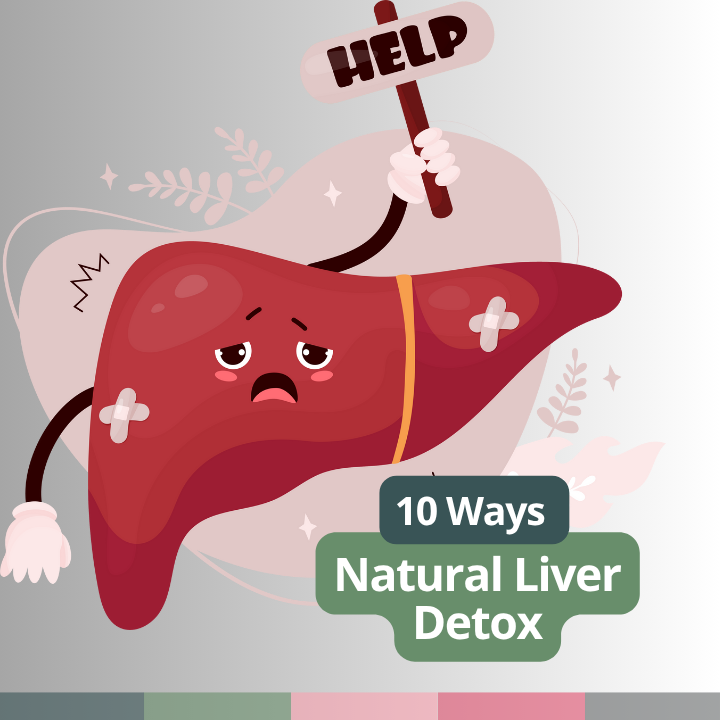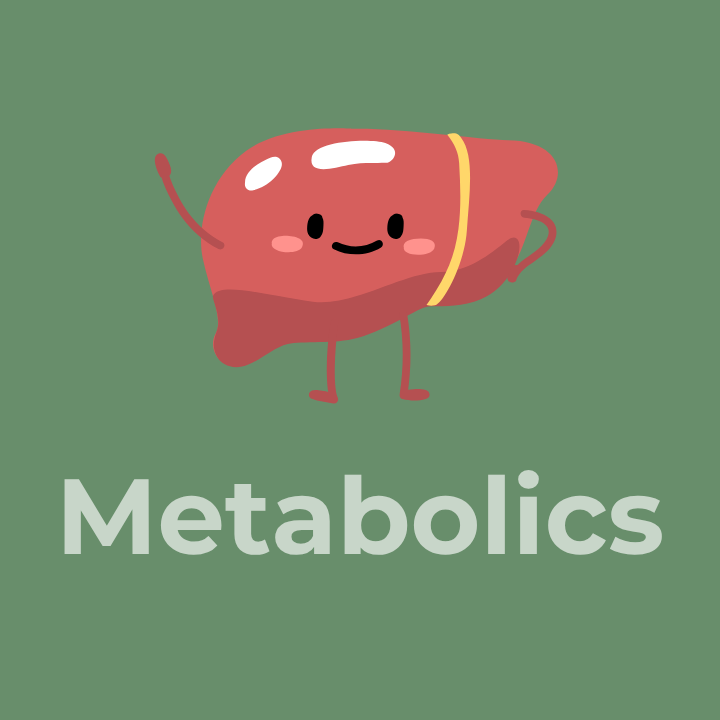The liver plays a crucial role in maintaining overall health, acting as the body’s detoxification center, processing nutrients, and producing essential biochemicals. For women over 50 navigating midlife shifts and aiming to age well, supporting the liver becomes especially important.
A sluggish or overburdened liver can exacerbate hormonal imbalances, contribute to stubborn weight gain, and accelerate signs of ageing.
While the liver is vulnerable to damage, it is also a remarkably resilient organ capable of regeneration when cared for properly. It works tirelessly to eliminate environmental toxins and modern lifestyle pollutants, especially relevant during and after menopause, when metabolic function often changes.
At Ms Longevity, the natural way to detox liver is more than a quick fix, it’s a routine, it’s a daily ritual and a cornerstone of metabolic health and radiant skin.
In this article, we explore ten practical and natural ways to support your liver. These daily habits are designed for women like you: health-conscious, curious, and committed to taking back control of their energy, digestion, and long-term vitality.
1. Herbal Teas
Benefits of Herbal Teas
Herbal teas are a popular and effective way to support liver health. Many herbal varieties possess detoxifying properties that can help the liver eliminate toxins more efficiently by supporting the liver’s detoxification process.
They also offer antioxidants that can combat oxidative stress, a contributor to liver damage. Incorporating herbal teas into your daily routine can be both enjoyable and beneficial, promoting hydration and relaxation.
Additionally, herbal teas can aid digestion, reduce inflammation, and improve bile flow, key processes for liver function. Certain herbal teas also support the liver’s detoxification pathways, helping to process and eliminate toxins more efficiently.
Some studies suggest that regular consumption of herbal teas may even lower the risk of liver diseases, making them a staple in any liver-friendly diet.
Recommended Herbal Varieties
Some of the best herbal teas for liver health include:
- Dandelion Root Tea: Known for its ability to stimulate bile production and enhance liver detoxification.
- Milk Thistle Tea: Contains silymarin, which has anti-inflammatory and antioxidant properties beneficial for liver regeneration.
- Green Tea: Rich in catechins, it supports fat metabolism and improves liver function.
- Turmeric Tea: Curcumin, the active compound in turmeric, has protective effects on the liver.
2. Healthy Diet
Importance of Whole Foods
A nutritious diet is essential for maintaining liver health. Whole foods, rich in nutrients and free from processing, deliver the vital vitamins, minerals, and antioxidants crucial for supporting optimal liver function.
These foods are rich in beneficial plant compounds that support liver health and the body’s detoxification processes. By focusing on a variety of whole foods, including fruits, vegetables, whole grains, and lean proteins, individuals can significantly improve their liver health and overall well-being.
Among vegetables, cruciferous vegetables are particularly valuable for liver health due to their ability to help the liver process harmful compounds. Supporting liver function is essential for maintaining health and preventing liver-related issues.
Moreover, a balanced diet can help maintain a healthy weight, thereby reducing the risk of fatty liver disease, which can occur when excess fat accumulates in liver cells.
Prioritising a diet that minimises added sugars, unhealthy fats, and excessive carbohydrates is crucial for liver health.
Essential Nutrients for Liver Health
Key nutrients that support liver health include a variety of foods that offer significant health benefits. Including healthy fats like olive oil in your diet can be especially beneficial for optimal liver function.
- Antioxidants: Found in fruits and vegetables, they protect the liver from oxidative stress.
- Fiber: Aids in digestion and helps the liver eliminate toxins.
- Omega-3 Fatty Acids: Reduce inflammation and fat accumulation in the liver.
- Olive Oil: A source of monounsaturated fats that support a healthy liver diet. It can help reduce liver fat, support healthy liver enzyme levels, and lower the risk of fatty liver disease, especially as part of the metabolic diet plan.
- B Vitamins: Essential for liver detoxification processes.
3. Regular Exercise
Types of Exercises for Liver Detox
Regular physical activity is another vital component of maintaining a healthy liver.
Exercise promotes blood circulation, which enhances the liver’s ability to detoxify the body efficiently.
Activities like walking, hiking, swimming, and strength training can help reduce liver fat and improve liver enzyme levels.
Maintaining healthy liver enzymes is crucial for overall liver function. Studies suggest that regular physical activity, along with a diet rich in unsaturated fats, is linked to a reduced risk of developing nonalcoholic fatty liver disease
Incorporating moderate-intensity aerobic exercise for at least 150 minutes per week, along with muscle-strengthening activities on two or more days, can yield significant benefits for liver health.
Yoga and other stress-reducing activities can also be beneficial as they promote relaxation and improved liver function.
Setting a Consistent Routine
Creating a consistent exercise routine can maximise the benefits for liver health. Finding activities that you enjoy will increase adherence to your regimen.
Setting realistic fitness goals and gradually increasing the intensity and duration of workouts can lead to sustainable long-term results.
Even small changes, such as taking the stairs instead of the elevator or walking during lunch breaks, can contribute positively to liver health.
4. Hydration
How Water Affects Liver Function
Staying well-hydrated is essential for optimal liver function. Water plays a crucial role in numerous bodily processes, including the transportation of nutrients and waste elimination. Adequate hydration helps the liver effectively filter toxins from the blood and facilitates digestion.
When the body is dehydrated, the liver can become overworked, leading to impaired detoxification and increased strain on liver cells.
Drinking enough water also helps maintain the fluid balance necessary for bile production, which is vital for digestion and fat metabolism. It is advisable to consume the recommended daily amount of fluids, which varies based on individual factors such as age, weight, and activity level.
Recommended Daily Intake
The standard guideline suggests drinking eight 8-ounce glasses of water daily, or 2 liters of water.
It is important to listen to your body and adjust your intake based on thirst, activity level, and environmental conditions. Additionally, incorporating hydrating foods such as fruits and vegetables can contribute to overall hydration.
5. Limit Alcohol Intake
Effects of Alcohol on Liver Health
Alcohol consumption can have detrimental effects on liver health, leading to conditions such as fatty liver disease, alcoholic hepatitis, and cirrhosis.
The liver metabolises alcohol, and excessive intake can overwhelm this process, resulting in the accumulation of fat and toxins within liver cells.
Long-term alcohol abuse can lead to significant liver damage and an increased risk of liver disease. Excessive drinking can cause the formation of scar tissue in the liver, which impairs liver function and results in permanent liver problems.
Understanding the impact of alcohol on liver health is crucial for those looking to cleanse and support their liver. Moderation is key, and awareness of one’s personal limits is essential in safeguarding against liver-related health issues.
Strategies for Reducing Alcohol Consumption
Some effective strategies for limiting alcohol intake include setting clear personal limits, opting for alcohol-free days, and choosing non-alcoholic beverages during social events.
Engaging in activities that do not revolve around drinking can also help break the habit. It may be beneficial to seek support from friends, family, or support groups for those who find it challenging to reduce alcohol consumption on their own.
6. Avoid Processed Foods
Identifying Processed Foods
Processed foods often contain unhealthy additives, preservatives, and high levels of sugars and unhealthy fats, which can negatively impact liver health.
These foods can contribute to inflammation, fat accumulation, and increased workload on the liver. Identifying processed foods, typically those with long ingredient lists or labels that include artificial substances, can empower individuals to make healthier dietary choices.
Common processed foods to limit include sugary snacks, fast food, refined grains, and products high in trans fats. By reducing the intake of these foods, individuals can support their liver health and overall wellness.
Healthier Alternatives
Instead of processed foods, individuals can opt for whole food alternatives. Fresh fruits and vegetables, whole grains, nuts, seeds, and lean proteins should form the basis of a liver-friendly diet. Preparing meals at home using fresh ingredients allows for better control over what is consumed and helps foster healthier eating habits.
7. Liver-Supportive Supplements
Popular Liver-Supportive Supplements
In addition to a healthy diet and lifestyle, certain supplements can provide added support for liver health. Milk thistle, artichoke extract, and N-acetylcysteine (NAC) are popular supplements that have been shown to support liver detoxification and regeneration. These supplements contain compounds that may help reduce inflammation and enhance liver function.
However, it is essential to approach supplementation with caution. Not all supplements are suitable for everyone, and their efficacy can vary based on individual health conditions and needs. Consulting with a healthcare professional before beginning any new supplement regimen is advisable.
Consulting Healthcare Professionals
Before starting any liver-supportive supplements, it’s wise to have a discussion with a healthcare provider. They can provide guidance based on individual health status and any existing medical conditions. This ensures that supplementation is safe and appropriate and allows for personalised recommendations tailored to improving liver health.
Looking for a healthcare provider learn more about Ms Longevity
8. Adequate Sleep
Connection Between Sleep and Liver Health
Sufficient quality sleep is vital for overall health, including liver function. During sleep, the body undergoes essential repair processes, including detoxification that primarily occurs in the liver. Poor sleep can lead to increased inflammation and stress, which can negatively affect liver health over time.
Inadequate sleep has been linked to various health issues, including obesity, which can further contribute to fatty liver disease. Prioritising good sleep hygiene can promote better liver health and enhance overall well-being.
Tips for Improving Sleep Quality
To improve sleep quality, individuals can adopt several strategies such as maintaining a consistent sleep schedule, creating a comfortable sleep environment, and limiting screen time before bed. Other practices, like relaxation techniques, meditation, and reducing caffeine and alcohol intake in the evening, can also contribute to better sleep. Establishing a nighttime routine that promotes winding down can help signal the body that it’s time to rest.
9. Stress Management
Impact of Stress on the Liver
Chronic stress can adversely affect liver health. Stress triggers the release of hormones that can lead to increased inflammation and the accumulation of fat in the liver. Additionally, stress may result in unhealthy coping mechanisms like poor dietary choices or excessive alcohol consumption, further complicating liver health.
Understanding the relationship between stress and liver health is essential for maintaining optimal liver function. Therefore, incorporating stress management techniques into daily life can significantly benefit overall health.
Effective Stress Reduction Techniques
Some effective stress reduction techniques include mindfulness practices, yoga, deep breathing exercises, and physical activity. Engaging in hobbies, spending time with loved ones, and practising time management can also help alleviate stress levels. Finding personal strategies that resonate can lead to lasting benefits for both mental and liver health.
10. Detoxifying Foods
Top Detoxifying Foods for Liver Health
Certain foods are renowned for their detoxifying properties, making them excellent choices for liver health. Foods such as beets, broccoli, garlic, and leafy greens can enhance the liver’s detoxification processes. These foods contain essential compounds that support the liver in breaking down harmful substances, help reduce fat buildup, promote healthy liver tissue, and decrease inflammation.
Beetroot juice, in particular, is rich in antioxidants and has been shown to reduce oxidative damage and inflammation in the liver. Animal studies suggest that beetroot juice may help protect the liver by activating detoxification enzymes and supporting overall liver health.
Grapefruit juice contains protective antioxidants that may decrease inflammation, reduce excessive connective tissue builds, and lower the risk of hepatic fibrosis caused by chronic inflammation.
Blueberry extract has demonstrated potential in test tube studies and animal studies to inhibit the growth of human liver cancer cells and promote liver health.
Including a variety of these detoxifying foods in your diet can help promote liver function and overall health. Incorporating colorful fruits and vegetables ensures a wide range of nutrients that contribute to well-being.
Incorporating Detox Foods into Your Diet
To incorporate detoxifying foods into your diet, consider adding them to meals or snacks throughout the day. For instance, adding beets to salads, using garlic in cooking, or enjoying a smoothie full of leafy greens can easily boost liver health. Planning meals that focus on whole, natural ingredients will create a liver-friendly diet that enhances detoxification.
Conclusion
The liver is a vital organ that requires constant care and attention to maintain optimal health, especially during and after menopause, when your body’s natural detox capacity can decline.
By implementing natural methods such as consuming herbal teas, maintaining a healthy diet, engaging in regular exercise, staying hydrated, limiting alcohol intake, avoiding processed foods, considering supplements, ensuring adequate sleep, managing stress, and incorporating detoxifying foods, individuals can effectively support their liver health.
Adopting these lifestyle changes will not only support liver health but also improve overall well-being.
Ms Longevity believes detoxing isn’t about drastic measures it’s about building sustainable habits. The journey begins with small, consistent steps that create lasting impact over time.
FAQs
How long does it take to detox your liver naturally?
It varies depending on your diet, lifestyle, and overall health. However, implementing these natural habits daily can begin to improve liver function within a few weeks.
What is the best drink to flush your liver?
Herbal teas like dandelion or milk thistle tea and warm lemon water are excellent options. They support hydration and liver function gently and effectively.
Can supplements help detox the liver?
Yes, supplements like milk thistle, turmeric, and NAC may support liver health. However, they work best in combination with healthy daily habits.
How often should I cleanse my liver?
While the liver naturally detoxifies itself, incorporating healthy habits consistently is more beneficial than periodic cleanses. Focus on maintaining a liver-friendly lifestyle year-round.
Are liver cleanses effective?
Many liver cleanses are marketed with claims of detoxification, but the best approach is to support liver function through a balanced diet and healthy lifestyle rather than relying on short-term solutions.
What are signs of an unhealthy liver?
Signs of an unhealthy liver can include fatigue, jaundice, abdominal pain, swelling, and changes in appetite. If you experience these symptoms, consult a healthcare professional.
Can I drink alcohol if I’m trying to support liver health?
Moderation is key. Limiting alcohol intake is important as excessive consumption can harm liver function. It’s best to consult with a healthcare provider regarding alcohol consumption based on individual health.
What foods should I avoid for liver health?
Avoid processed foods, trans fats, excessive sugars, and high-sodium items, as these can contribute to liver inflammation and fat accumulation.






